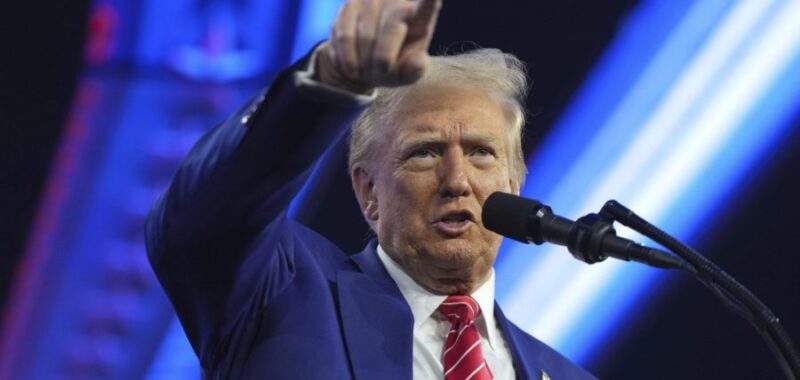
There’s been much hand-wringing over President-elect Donald Trump’s promises to use the massive power of the Justice Department and the FBI to undertake revenge prosecutions against his perceived political enemies — a frightening prospect, because criminal scrutiny can land people in jail even if they’ve done nothing wrong.
But civil claims can also be serious business. And Trump has been busily suing the press, flagging another possible casualty of his next administration: the First Amendment.
Last week, Trump sued the Des Moines Register newspaper and its parent company and former pollster Ann Selzer for “brazen election interference” over a poll published a few days before the election, which indicated that Vice President Kamala Harris would win Iowa by 3 points (Trump in fact won by 13 points).
The lawsuit alleges that Selzer intentionally swung the poll results in favor of Harris and seeks money damages and an order compelling the news outlet to “disclose all information upon which they relied” for the poll. A spokesperson stated that the paper already released the “poll’s full demographics, cross tabs, weighted and unweighted data, as well as a technical explanation from pollster Ann Selzer.”
Trump’s lawyers argue that the poll forced Republicans to “divert campaign time and money to areas in which they are ahead” and deceived “the public into believing that Democrat candidates are performing better than they really are.” They cite Chapter 714H of the Iowa Consumer Fraud Act, which addresses “an unfair practice, deception, fraud, false pretense or false promise … with intent that others rely upon [it].” That law was passed in 2009 to let private parties sue over alleged consumer fraud and has been used to challenge things like the sale of herbal pills for alleged brain-boosting properties and stem-cell therapy to fight aging.
Trump has brought a similar deceptive trade claim against CBS News for $10 billion (yes, really) over an interview “60 Minutes” did with Harris.
Seth Stern, advocacy director for the Freedom of the Press Foundation, warned that the Iowa lawsuit could create an environment where “journalists can’t help but look over their shoulders knowing the incoming administration is on the lookout for any pretext or excuse to come after them.”
This comes on the heels of the president-elect reaching a settlement for $15 million in a defamation lawsuit against ABC News. The network (for which I am a legal contributor) also agreed to apologize over the alleged libel — assertions by anchor George Stephanopoulos that Trump had been found “liable for rape” in E. Jean Carroll’s $5 million civil trial concluded last may. The jury found that Trump had sexually abused Carroll in a department store dressing room in 1996
In dismissing Trump’s countersuit for defamation against Carroll for indicating that he had raped her, the judge concluded that “the jury’s verdict … establishes, as against Mr. Trump, the fact that Mr. Trump ‘raped her,’ albeit digitally rather than with his penis.” But a different judge refused to dismiss Trump’s similar defamation claim against ABC News.
The bottom line: Lawsuits can be unpredictable, time-consuming and expensive for defendants, even if there is no merit to them. Trump understands this. The result is a chilling effect on the media and polling industries, which might think twice before they publish anything displeasing to Trump — even if it is true.
After unsuccessfully suing reporter Tim O’Brien over his reporting on his wealth, Trump said, “I spent a couple of bucks on legal fees, and they spent a whole lot more. I did it to make his life miserable, which I’m happy about.”
In 2023, he sued publisher Simon and Schuster for copyright violations in federal court in Florida, claiming that the company had engaged in “systematic usurpation, manipulation, and exploitation” of audio recordings of author Bob Woodward’s interviews of Trump. In a recent court filing, Trump encouraged the publisher to “follow Mr. Stephanopoulos’ expression of contrition.”
Law professor Samantha Barbas remarked that “it’s clear that Trump is waging war on the press. Trump and his lawyers are going to use any legal claim that they can think has a chance of sticking.” Robert Corn-Revere, chief counsel of the Foundation for Individual Rights and Expression, likewise called the Iowa lawsuit “absurd” and “a direct assault on the First Amendment. Newspapers and polling firms are not engaged in ‘deceptive practices’ just because they publish stories and poll results President-elect Donald Trump doesn’t like. Getting a poll wrong is not election interference or fraud.”
The First Amendment expressly guarantees “freedom … of the press.” Moreover, the Supreme Court in the landmark 1964 New York Times v. Sullivan case adopted an “actual malice” standard for defamation suits brought by government officials or public figures against the media. In other words, such people must prove that a statement was made “with knowledge that it was false or with reckless disregard of whether it was false or not.”
Joel Simon, director of the CUNY Journalism Protection Initiative, accordingly stated of the Iowa lawsuit, “The possibility of legal victory is slim because under the ‘actual malice’ standard, reporting done in good faith is protected in the U.S. But for a smaller or less resourced news organization, mounting a legal defense can be a serious challenge.”
To enable courts to get rid of bogus defamation suits more easily, a number of states have passed anti-SLAPP (or “strategic lawsuits against public participation”) laws. Earlier this month, Sen. Ron Wyden (D-Ore.) and Reps. Jamie Raskin (D-Md.) and Kevin Kiley (R-Calif.) introduced the bipartisan Free Speech Protection Act, “a new federal anti-SLAPP law that is intended to protect journalists and the public by providing a means to dismiss frivolous lawsuits, including suits alleging defamation, in federal court.”
Wrote Trump on Truth Social, “REPUBLICANS MUST KILL THIS BILL!”
Kimberly Wehle is author of the new book “Pardon Power: How the Pardon System Works — and Why.”

